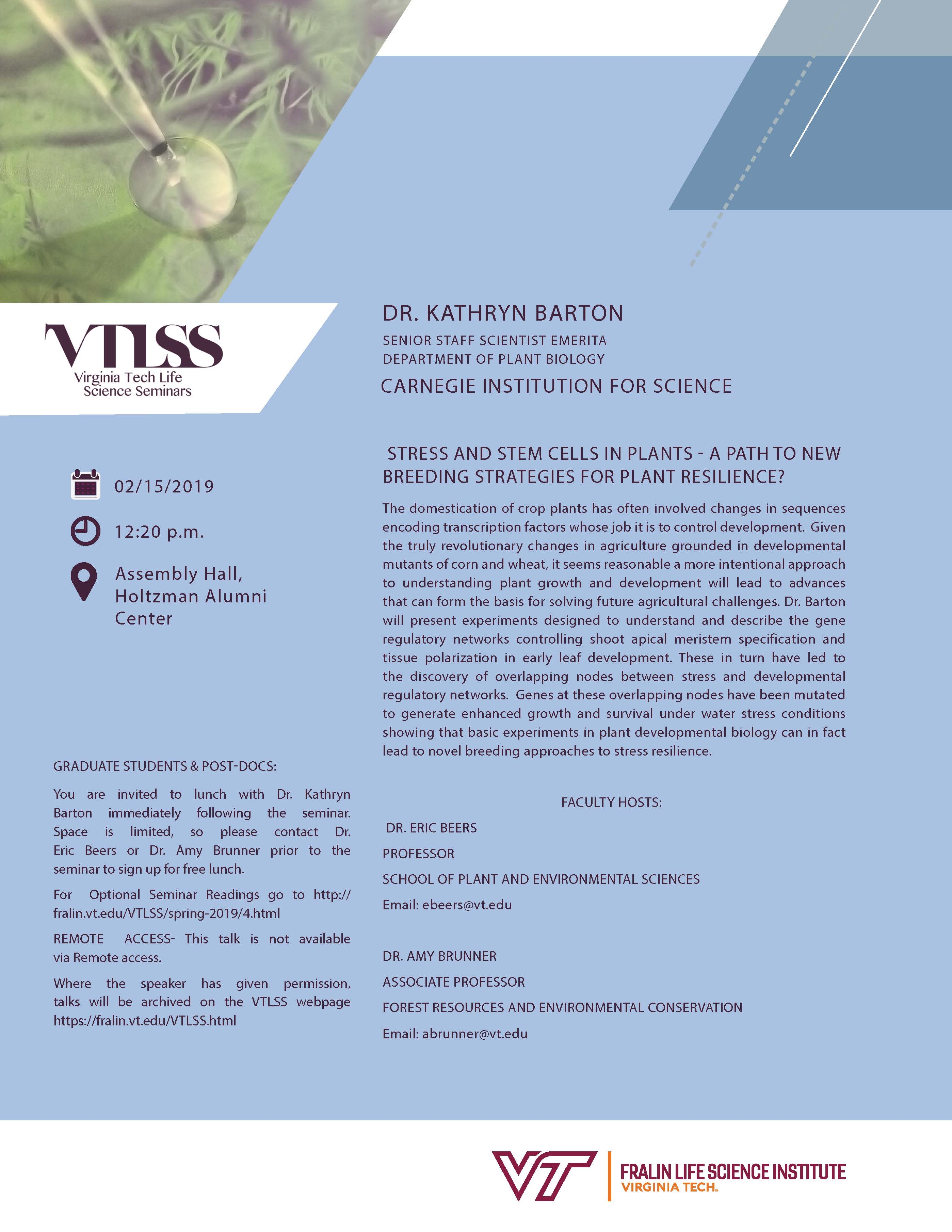Stress and Stem Cells in Plants - A Path to New Breeding Strategies for Plant Resilience?
Dr. Kathryn Barton
February 15 at 12:20pm in the Assembly Hall, Holtzman Alumni Center
Hosted by Drs. E. Beers and A. Brunner
Kathryn Barton earned her BS in Molecular Biology (1983) and PhD in Genetics (1989) at the University of Wisconsin - Madison. Her graduate work was on the genes controlling sex determination in the C. elegans germline. As a postdoctoral scientist she switched to plants, pursuing research in Scott Poethig’s laboratory at the University of Pennsylvania where she began working on the problem of how plants make new shoot apical meristems and leaves. She was an assistant (1992- 1999) and associate professor (1999 - 2002) in the Department of Genetics at the University of Wisconsin - Madison before moving to the Department of Plant Biology at the Carnegie Institution for Science on the Stanford campus where she has recently transitioned to emerita status.
The domestication of crop plants has often involved changes in sequences encoding transcription factors whose job it is to control development. Given the truly revolutionary changes in agriculture grounded in developmental mutants of corn and wheat, it seems reasonable a more intentional approach to understanding plant growth and development will lead to advances that can form the basis for solving future agricultural challenges.
I will present experiments designed to understand and describe the gene regulatory networks controlling shoot apical meristem specification and tissue polarization in early leaf development. These in turn have led to the discovery of overlapping nodes between stress and developmental regulatory networks. Genes at these overlapping nodes have been mutated to generate enhanced growth and survival under water stress conditions showing that basic experiments in plant developmental biology can in fact lead to novel breeding approaches to stress resilience.
Reference: Liu et al., 2016. The Arabidopsis transcription factor ABIG1 relays ABA signaled growth inhibition and drought induced senescence. eLife 2016;5:e13768
Additional Reading: The Wizard and The Prophet, by Charles C. Mann. 2018. Alfred A. Knopf Publishers.
This book is a dual biography covering the lives of Norman Borlaug (The Wizard) and William Vogt (The Prophet). These men, both scientifically active in the 20th century, espoused different philosophies regarding, and different prescriptions for how to address, the problem of feeding earth’s burgeoning human population. Borlaug was confident technology could solve the problem and indeed, the wheat he bred in the 1950s and 1960s formed the basis of the green revolution, making possible the lives of billions of people currently inhabiting earth. Vogt felt this approach would only exacerbate the problem, increasingly stress the planet’s resources and only delay the day of reckoning. In his view, conservation and population control were the solution.
This book contrasts the two scientists and considers how each would solve problems of food, water, and energy production as well as climate change facing us today. Most of the scientists in my field - plant molecular genetics - are “Borlaugians” at heart although we may not have thought about it in these terms. We believe that if we can only understand better how plants grow, we can engineer solutions to the problem of sustainable human survival on planet earth. We rarely consider the notion the “Vogtians” may be correct and the green revolution has only exacerbated human impact on our planet.
I will be leading a book club on this book this winter. A summary of book club discussions will be posted on the website http://vanishingbananas.blogspot.com/ beginning January 7, 2018. Feel free to comment as you are moved to do so.
http://vanishingbananas.blogspot.com/ - a blog about plants, food and fun in the lab.

This seminar will NOT be livestreamed or recorded.


